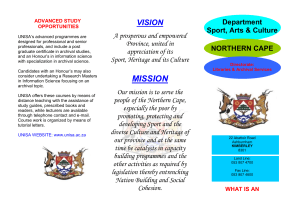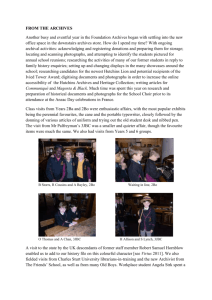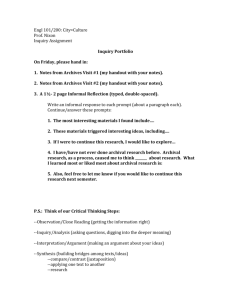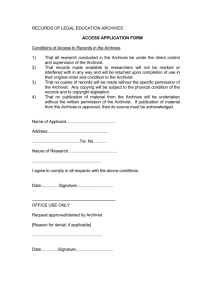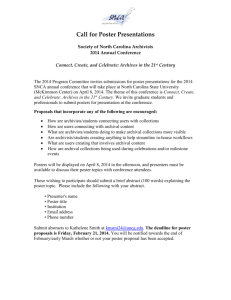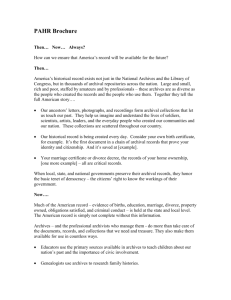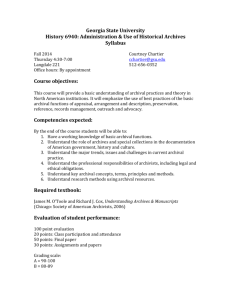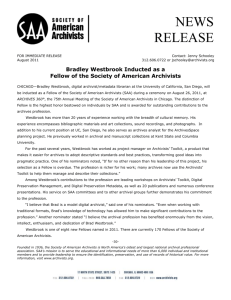Syllabus - Aubrey Iglesias
advertisement
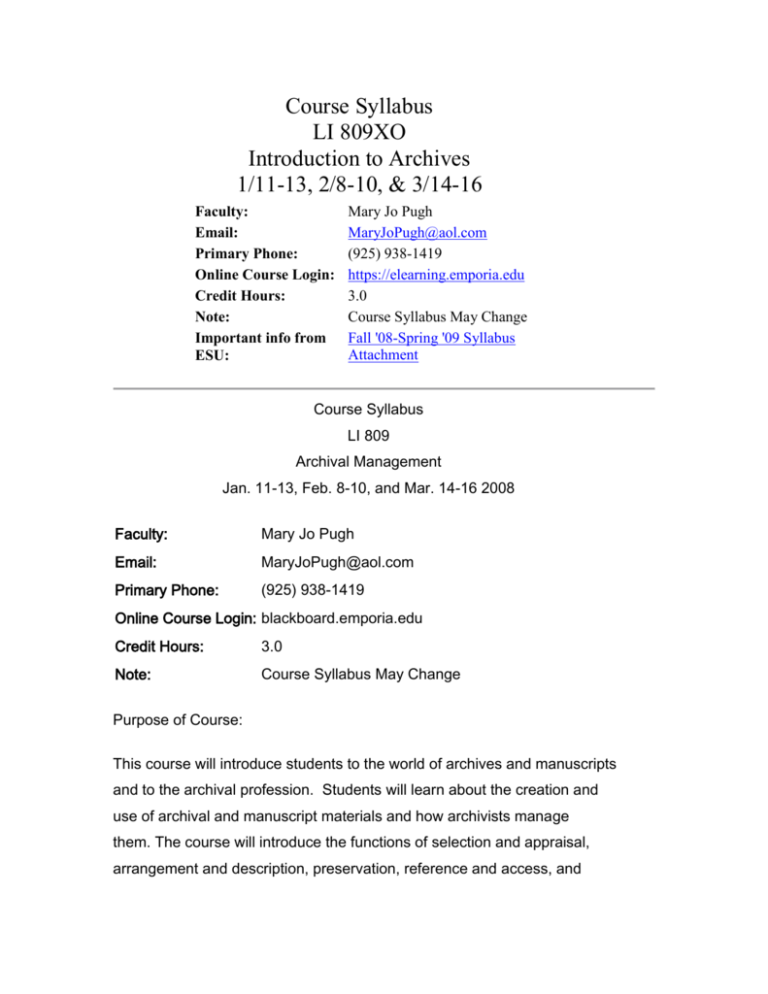
Course Syllabus LI 809XO Introduction to Archives 1/11-13, 2/8-10, & 3/14-16 Faculty: Email: Primary Phone: Online Course Login: Credit Hours: Note: Important info from ESU: Mary Jo Pugh MaryJoPugh@aol.com (925) 938-1419 https://elearning.emporia.edu 3.0 Course Syllabus May Change Fall '08-Spring '09 Syllabus Attachment Course Syllabus LI 809 Archival Management Jan. 11-13, Feb. 8-10, and Mar. 14-16 2008 Faculty: Mary Jo Pugh Email: MaryJoPugh@aol.com Primary Phone: (925) 938-1419 Online Course Login: blackboard.emporia.edu Credit Hours: 3.0 Note: Course Syllabus May Change Purpose of Course: This course will introduce students to the world of archives and manuscripts and to the archival profession. Students will learn about the creation and use of archival and manuscript materials and how archivists manage them. The course will introduce the functions of selection and appraisal, arrangement and description, preservation, reference and access, and outreach and education. The course serves as a foundation for further study in archival work or as an introduction for information professionals in all settings. Course Learning Objectives: At the conclusion of this course, students will demonstrate introductory knowledge of • recordmaking and recordkeeping systems in a variety of settings and time periods; • the place of archives in the universe of information: records, archives, manuscripts, books, periodicals, audio-visual materials, and electronic formats • the variety of archival institutions and missions; • basic functions and principles by which archival institutions carry out their mission, including selection and appraisal, arrangement and description, reference and access, and outreach and advocacy; • descriptive tools used to provide intellectual and administrative control for levels of archival arrangement, such as guides, finding aids, inventories, and bibliographic records; • basic preservation programs in archival institutions. Required Materials One book is available for purchase. Gregory S. Hunter, Developing and Maintaining Practical Archives. Second edition. 1-55570-467-0. 2003. 8 1/2 x 11. 450 pp. $65.00 Other required readings are available in an electronic course reader, marked in the syllabus with an * Recommended Resources • Monitor listservs and electronic mailing lists available at http://www.archivists.org/listservs/index.asp#archives-archivists • Especially the Archives and Archivists list at http://forums.archivists.org/read/?forum=archives Course Requirements On-line discussion of readings for first weekend completed by noon Thursday January 10. Institutional Comparison paper, 4-5 pages in length, double spaced. Due to instructor by email noon Tuesday Feb 4 and posted on the class blackboard. Compare and contrast the mission, scope of collections, methods of acquisition, and use policies of the Library of Congress Manuscripts Division (http://www.loc.gov/rr/mss/) and the National Archives (www.archives.gov) Additional information will be posted on the class blackboard and discussed on Sunday January 13.. On-line discussion of readings for the second weekend: completed by noon Thursday Feb 7. Paper: One paper is required, 10 to 12 pages double spaced. Due to instructor by email and posted on blackboard by noon March 10. Revised copy due to instructor by END of TERM, date to be determined Paper will discuss one collection at the Oregon Historical Society and analyze its creation, physical attributes, content, arrangement, description, potential uses, and preservation. Additional information will be posted on the class blackboard and discussed on Sunday January 13. Grading Criteria and Scale 10 % On-line discussion 1 10 % On-line discussion 2 20 % Class participation 20 % Institutional Comparison paper 40% Collection Paper Course Calendar Friday January 11, 2008 : Classroom Nature of Archives: Users of Archives Required readings: Hunter, Chapter 1 Explore the website Understanding Society through its Records at http://john.curtin.edu.au/society/ especially the sections “Overview,” “Evidence,” and “Justice. “ Note the “Information Family Tree” at http://john.curtin.edu.au/society/evidence/tree.html. Saturday. January 12: 9:00 Oregon Historical Society Nature of Archives: Makers of Records Required readings: David M. Levy, “Meditation on a Receipt,” Chapter 1, Scrolling Forward: Making Sense of Documents in the Digital Age (New York: Arcade Publishing, 2001), 7-20.* JoAnne Yates, “Internal Communication Systems in American Business Structures: A Framework to Aid Appraisal” American Archivist 48 (Spring 1985): 141-158 * Margaret Hedstrom, “Understanding Electronic Incunabula: A Framework for Research on Electronic Records,” American Archivist 54 (Summer 1991): 334–54. * Peter J. Wosh, “Going Postal,” American Archivist 61 (Spring 1998): 220–39. * National Association of Secretaries of State (NASS) and National Electronic Commerce Coordinating Council (eC3) Digital Archiving: From Fragmentation to Collaboration at http://www.ec3.org/Pubs/PubSymPapers.htm Optional readings: JoAnne Yates, Control through Communication: The Rise of System in American Management , especially chapters 1-3. James O'Toole “Toward a Usable Archival Past: Recent Studies in the History of Literacy,” American Archivist 58 (Winter 1995): 86–99. Tour of the Archives and Manuscripts, Oregon Historical Society Saturday afternoon January 12: Classroom Nature of Archives: Keepers of Archives Required readings: Hunter, Chap 13 John Fleckner, “'Dear Mary Jane:' Some Reflections on Being an Archivist,” American Archivist 54 (Winter 1991): 8-13 * Steven L. Hensen, “Revisiting Mary Jane, or Dear Cat: Being Archival in the 21 st Century,” American Archivist 65 (Fall/Winter 2002): 168-175 * Academy of Certified Archivists, The 2003 Role Delineation Statement at http://www.certifiedarchivists.org/html/RoleDelineation.html Society of American Archivists Code of Ethics for Archivists 5 Feb 2005 http://www.archivists.org/governance/handbook/app_ethics.asp International Council on Archives: Code of Ethics 6 September 1996 http://www.ica.org/en/node/30046 Society of American Archivists, www.archivists .org Selection and Appraisal Records management Acquisitions Required readings: Hunter, Chap 2,Chap 3, Chap 4 Elisabeth Kaplan, “We Are What We Collect, We Collect What We Are: Archives and the Construction of Identity” American Archivist 63 (Spring/Summer 2000): 126-151. * Susan D. Steinwall, “Appraisal and the FBI Case: For Whom Do Archivists Retain Records?” American Archivist 49 (Winter 1986): 52--64 * Guide to Donating Your Personal or Family Papers to a Repository http://www.archivists.org/publications/donating-familyrecs.asp Guide to Donating Your Organizational Records to a Repository http://www.archivists.org/publications/donating-orgrecs.asp Sun January 13 Classroom Selection and Appraisal (cont.) Discussion of the paper assignments **** Friday February 8: Classroom Arrangement and Description Required readings: Hunter Chap 5, Chap 6 Frederic Miller, Arranging and Describing Archives and Manuscripts (Chicago: Society of American Archivists: 1990). Chapters 3, 4, 6. pp.19-44, 57-68 * Victoria Irons Walch, Standards for Archival Description (Chicago: Society of American Archivists: 1999). “Introduction” and Chapter 6, “Authority Control” at http://www.archivists.org/catalog/stds99/index.html Daniel V. Pitti, “Encoded Archival Description: The Development of an Encoding Standard to Archival Finding Aids,” American Archivist 60 (Summer 1997): 268-283. * Reference Works: Describing Archives: A Content Standard . (Chicago: Society of American Archivists, 2004). 291 pp. Content standard for description of archival records and manuscript collections. The volume consists of three parts: "Describing Archival Materials," "Describing Creators," and "Forms of Names." Separate sections discuss levels of description and the importance of access points to the retrieval of descriptions. Appendices include a glossary, list of companion standards, and crosswalks to APPM , ISAD(G), ISAAR(CPF), MARC 21, and EAD. THE EAD COOKBOOK 2002 at http://www.archivists.org/saagroups/ead/ead2002cookbookhelp.html Saturday morning February 9 8:30 Oregon Historical Society Arrangement and Description practicum Examine collections for paper assignment Saturday afternoon February 9: Classroom Arrangement and Description (cont.) Sunday February 10: Classroom Arrangement and Description (cont.) **** Friday March 14 Classroom Preservation, security, and disaster planning Hunter Chap 7 and 8 Saturday morning March 15 9:00 Oregon Historical Society Discuss collections and drafts of papers Non-textual formats: photographs, graphic, audiovisual, electronic Hunter Chap 10, 11 Saturday afternoon March 15: Classroom Access, Reference, Use, and Outreach Hunter Chap 9 Elizabeth Yakel and Deborah A. Torres, “AI: Archival Intelligence and User Expertise,” American Archivist , 66 (Spring/Summer 2003): 51-78. * Barbara L. Craig, “Perimeters with Fences? Or Thresholds with Doors? Two Views of a Border,” American Archivist , 66 (Spring/Summer 2003): 96-101. * Elsie Freeman Finch and Paul Conway, “Talking to the Angel: Beginning Your Public Relations Program,” in Advocating Archives: An Introduction to Public Relations for Archivists . Chicago : SAA and Scarecrow Press, Inc. 1994. pp.5-22. * Sun March 16: Classroom Review, summary, conclusion Faculty-Initiated Student Withdrawal Procedure Students should be aware that your instructor follows the university’s policy of faculty-initiated student withdrawal. It reads as follows: “If a student’s absences from class or disruptive behavior become detrimental to the student’s progress or that of other students in the class, the faculty member shall attempt to contact the student in writing about withdrawing from the class and shall seek the aid of the office of Vice President of Student Affairs to help insure contacting the Student. The Office of the Vice President of Student Affairs shall provide the student information about the existing appeals procedures. Upon receiving a written report from the faculty member, the Vice President of Student Affairs may initiate a student withdrawal from the class. None of the above implies or states that faculty members are required to initiate the student withdrawals for excessive absence. [Policy and Procedures Manual 43.11] "I" Incomplete Grading Policy The grade of "incomplete" will be given only for personal emergencies which are verifiable and when the student has done passing work in the course. Academic Dishonesty At Emporia State University, academic dishonesty is a basis for disciplinary action. Academic dishonesty includes but is not limited to activities such as cheating and plagiarism (presenting as one's own the intellectual or creative accomplishments of another without giving credit to the source or sources.) The faculty member in whose course or under whose tutelage an act of academic dishonesty occurs has the option of failing the student for the academic hours in question and may refer the case to other academic personnel for further action. Emporia State University may impose penalties for academic dishonesty up to and including expulsion from the university. Disabilities Policy Emporia State University will make reasonable accommodations for persons with documented disabilities. Students need to contact the Director of Disability Services and the professor as early in the semester as possible to ensure that classroom and academic accommodations are implemented in a timely fashion. All communication between students, the Office of Disability Services, and the professor will be strictly confidential. Contact information for the Office of Disability Services: Office of Disability Services 211 S Morse Hall Emporia State University 1200 Commercial Street / Box 23 Emporia, KS 66801 Phone : 620/341-6637 TTY: 620/341-6646 Email: disabser@emporia.edu Copyright © 2008 ESU SLIM School of Library & Information Management Emporia State University 1200 Commercial Campus Box 4025 Emporia, KS 66801 voice: (800) 552-4770 voice: (620) 341-5203 - other numbers fax: (620) 341-5233 Content comments for the instructor: MaryJoPugh@aol.com Technical questions: slimhelp@emporia.edu
